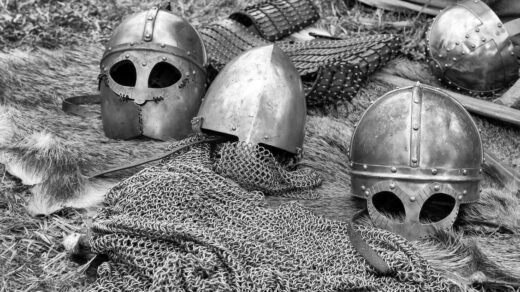The Story Behind ‘Stairway to Heaven
by Ghoema November 28, 2023 · Fun Facts
In the pantheon of rock music, few songs hold a candle to “Stairway to Heaven.” Voted as one of the greatest rock songs of all time, this masterpiece by Led Zeppelin has left an indelible mark on the music world. From its inception to its complex lyrical interpretations and the artists’ evolving relationship with it, the story behind “Stairway to Heaven” is a captivating tale that transcends generations.
“Stairway to Heaven” was the brainchild of Robert Plant, who penned the lyrics, and the virtuoso guitarist Jimmy Page, who composed the mesmerizing melody. This rock opus not only became Led Zeppelin’s signature song but also a timeless rock anthem cherished by millions.
Most Requested, Never Released
It’s a paradox of rock history—despite being the most requested song on FM radio during the 1970s, “Stairway to Heaven” was never officially released as a single. Radio stations, however, received promotional singles, which have since become coveted collector’s items, a testament to the song’s enduring popularity.
From December 1970 to March 1971, Led Zeppelin embarked on the recording journey that would culminate in the release of their untitled fourth album on November 8, 1971. Commonly referred to as “Led Zeppelin IV,” this album would house the timeless treasure that is “Stairway to Heaven.”
One of the most intriguing aspects of “Stairway to Heaven” is the ongoing debate about its meaning. Robert Plant himself has shared insights into the song’s lyrics, which begin with the enigmatic line, “There’s a lady who’s sure all that glitters is gold, and she’s buying a stairway to heaven.” Plant’s initial interpretation leans towards cynicism—a commentary on a woman’s pursuit of materialism without consideration.
However, in later interviews, Plant adopts a more nebulous stance, asserting that the song lacks any concrete meaning. His shifting perspectives on the lyrics add an extra layer of mystique to the song’s legacy.
Jimmy Page’s Creative Process
While Plant provided the lyrical magic, Jimmy Page was the maestro behind the haunting music and captivating guitar solos that define “Stairway to Heaven.” Page’s creative process involved meticulously weaving together various guitar pieces he had composed over time. Armed with a tape recorder, he embarked on a journey to craft a musical masterpiece.
A Rocky Debut
The public unveiling of “Stairway to Heaven” on March 5, 1971, at Belfast’s Ulster Hall marked a significant moment in rock history. Led Zeppelin, already renowned for their musical prowess, had embarked on a journey to present a song that would soon become an iconic anthem. However, this inaugural performance did not go as smoothly as expected.
Anticipation vs. Reality
As Led Zeppelin took to the stage that night, the anticipation among the audience was palpable. The band had earned a reputation for delivering electrifying performances, and fans were eager to witness their latest musical creation. Little did they know that they were about to be introduced to a song that would later become synonymous with the band’s legacy.
“Stairway to Heaven” represented a departure from Led Zeppelin’s more familiar repertoire of hard-hitting rock and blues. The song’s ethereal and melodic opening hinted at a different musical journey—one characterized by intricate guitar work and introspective lyrics. For fans accustomed to the band’s explosive hits, this was uncharted territory.
A Bored Audience and Boos
As the performance unfolded, it became evident that “Stairway to Heaven” was unlike anything the audience had experienced from Led Zeppelin before. John Paul Jones, the band’s bass player, recalled the atmosphere vividly. Fans were not immediately swept away by the song’s haunting beauty; instead, some were visibly bored and impatient.
In some accounts of that historic night, there were reports of outright boos from the audience during the performance of “Stairway to Heaven.” This controversial reaction, though disheartening, underscored the song’s departure from the expected. It was a testament to the audience’s loyalty to Led Zeppelin’s established hits and their initial resistance to embrace this unconventional masterpiece.
The Turning Point
While the song’s debut may have been met with mixed reviews, it was merely the beginning of its journey. Over time, “Stairway to Heaven” would transcend this rocky start and go on to captivate the hearts of millions worldwide. Its enduring allure would become evident as it became one of the most iconic rock songs ever recorded, proving that initial skepticism could not dim its brilliance.
From Rejection to Reverence
Despite the rocky start, “Stairway to Heaven” gradually won hearts and carved a niche for itself in the rock music landscape. By 1975, the song’s soaring popularity compelled Led Zeppelin to feature it as a concert finale, a testament to its undeniable appeal. Yet, as the years passed, the song underwent a transformation, courtesy of Robert Plant’s desire for change.
During live performances in the late 1970s, Robert Plant occasionally injected a dose of eccentricity into the song’s lyrical delivery. Lines like “Does anybody remember laughter?” and “Does anybody remember forests?” became whimsical additions to the song. These playful improvisations showcased Plant’s willingness to keep the song fresh and dynamic.
As the 1980s rolled in, Robert Plant’s relationship with “Stairway to Heaven” took a noticeable turn. In 1988, he openly expressed his aversion to the song, stating that performing it frequently made him feel as though he’d break out in hives. He reflected on the song’s significance when he wrote the lyrics in 1971, but nearly two decades later, his sentiments had shifted. Plant bid adieu to the song, declaring that it was no longer for him.
Robert Plant’s growing discomfort with “Stairway to Heaven” reached a unique pinnacle when he made a monetary pledge to a public radio station. His offer was simple yet unconventional—pledge to never play “Stairway to Heaven” again on the airwaves. By 1991, the song had been played an astonishing 2,874,000 times on radio stations, an astonishing feat that testified to its enduring allure.
The Everlasting Echo
As we journey through the story behind “Stairway to Heaven,” we unravel a rock anthem’s evolution. From its birth as a creative collaboration between Robert Plant and Jimmy Page to its emergence as a live performance sensation and, ultimately, Robert Plant’s bid adieu, the song’s legacy is a testament to the ever-shifting dynamics of music and creativity.
“Stairway to Heaven” may no longer be Robert Plant’s chosen path, but it continues to guide countless music enthusiasts through its melodious journey. Its journey serves as a testament to the enduring allure of rock legends and the transformative power of music that transcends generations.


